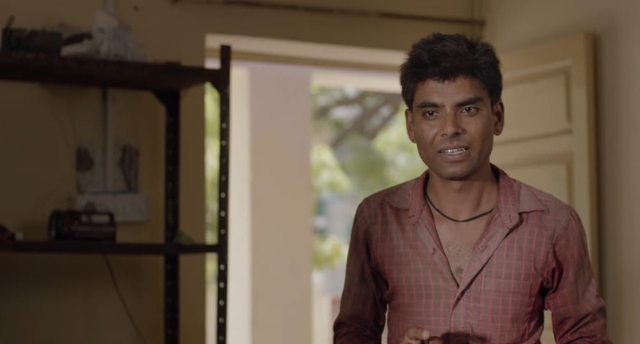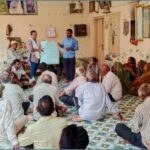At a little over 30, Jigar Nagda likes to make deep cinema that explores the myriad dimensions of life in rural India. That’s not a surprise because Nagda, who calls Mumbai his hometown, actually has roots in rural Rajasthan.
I came to the conclusion that electricity is in fact a luxury for many people. This inspired me to show the world how solar power can offer a solution, and be a ray of hope for those who still live in darkness.

Having been an assistant director for projects like Anurag Kashyap’s Bombay Velvet, Window, Divorce, Crime Patrol and Aalap, he directed his own films like I Love You Aishwarya, Whisper of Mountains and Aravali–The Lost Mountains. Now he’s out with his first feature film titled Batti–A Boy Who Dreamt of Electricity, which has been shot in Rajasthan’s Mewadi language.
A regional language feature film with global appeal
“This movie’s storyline revolves around a young tribal boy who embarks on a journey to bring electricity to his home in the village. He faces many challenges along the way but finds a ray of hope when he stumbles upon a solar lantern in the city,” says Nagda.
The film premiered at the Kolkata International Film Festival and has been screened at a host of other film events including the Asian Film Festival, the Sharjah International Film Festival and the Jaffna International Film Festival.

It was also screened in Germany, Finland, USA and Sri Lanka. “I believe that the message I was trying to convey through this project was understood in all the places that the movie was shown. Around 13% of the world’s population reportedly lives without electricity,” says Nagda. “During the Q&A round after the film’s screening, I got a lot of queries on this issue,” he adds.
Produced by Udaipur Pictures, the cast of the film includes actors Kunal Mehta, Rakhi Mansa and Mahendra Srivas.
“The entire movie was shot in the local Rajasthani language Mewadi. Unfortunately, Rajasthan doesn’t have a vibrant film industry the way some other states do. This was a challenge for me because I was looking for a particular character to play the lead with a specific look, a good command over the dialect and acting skills. I finally selected the key cast from the Udaipur theatre community. The secondary cast was selected from the pool of local villagers to maintain authenticity in the look and feel of the film. We trained them in workshops,” shares Nagda.
Also read: Moving mountains with rural-based themes on celluloid
Inspiration to make a difference
The idea for this movie struck Nagda while he was on a solo trip to Rajasthan. “As a travel buff, I was touring the countryside when I noticed a small hut perched on a big hill. This was a picture-perfect image from afar, but on closer inspection, I realised that this particular hut didn’t have electricity or water,” recalls Nagda.
Moved by the plight of the residents of the hut, Nagda came to realise that the reason this tenement lacked basic facilities was that it was far removed from the electricity grid. The local administration couldn’t spend much on providing water and electricity to a single living quarter within the village.

“I came to the conclusion that electricity is in fact a luxury for many people. This inspired me to show the world how solar power can offer a solution, and be a ray of hope for those who still live in darkness,” offers Nagda.
As someone born and brought up in Mumbai, Nagda had no clue what life in rural India was really like. However, it was travel that opened his eyes to reality. “Through travel, I became aware of the many issues that plague the countryside, and I feel compelled to tell these stories through my films,” he says.
Nagda says he would like to see more independent filmmakers travel the hinterland to get inspired and get fresh ideas for their films. “We tend to execute most creative projects in the city, but all creative professionals need to spend more time in the rural areas to get a taste of the local culture and the stories embedded there waiting to be told,” he says.
Rising above hurdles
Making a film independently may be a rewarding experience but is not without its challenges. “When you’re making art that may not be commercially viable, it’s difficult to get someone to invest money in your vision,” says Nagda candidly. Most independent cinema is made with one’s own funds, or by pooling in resources of like-minded individuals.
“And even when you manage to raise the funds, you always need the support of locals, especially when you’re shooting in a rural area,” he points out. He feels knowing the local culture came in handy when he was shooting this film because it was easier to find the support of locals. To this end, Nagda says he spent time with the locals of the area before shooting commenced.

From being local to thinking global, Nagda says he feels proud that he has been successful in showcasing a regional language film on the global stage. “I come from Rajasthan, where very few films are made in the local language. I hope more films made in the Mewadi mother tongue get an opportunity on international platforms. I hope to have put my region, and language on the map,” he says, signing off.
Also read: Manyachiwadi becomes Maharashtra’s first solar-powered village
Batti–The Boy Who Dreamt of Electricity will be released to the public by June 2025, and should be on screens in cities like Jaipur, Udaipur, Delhi, Mumbai, Kolkata, Bangalore and Hyderabad.
The lead image on top shows a still from the film Batti–A Boy Who Dreamt of Electricity. (Movie still courtesy Jigar Nagda)
Smriti Mukerji is a freelance journalist based out of Delhi.








